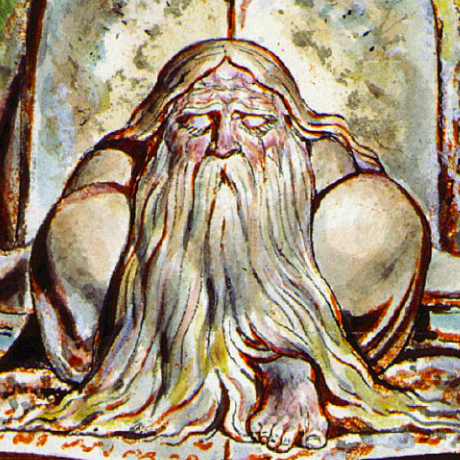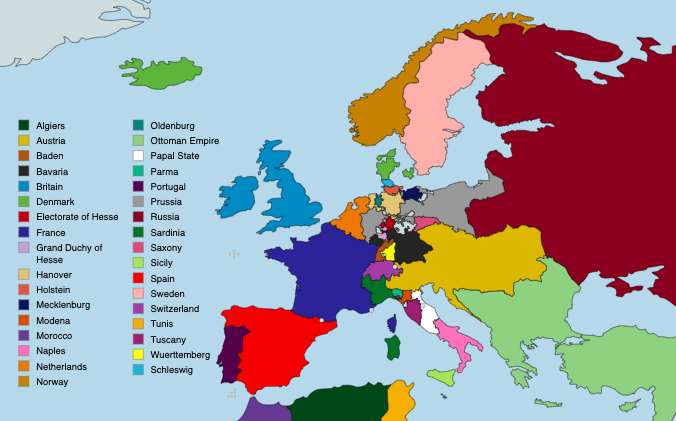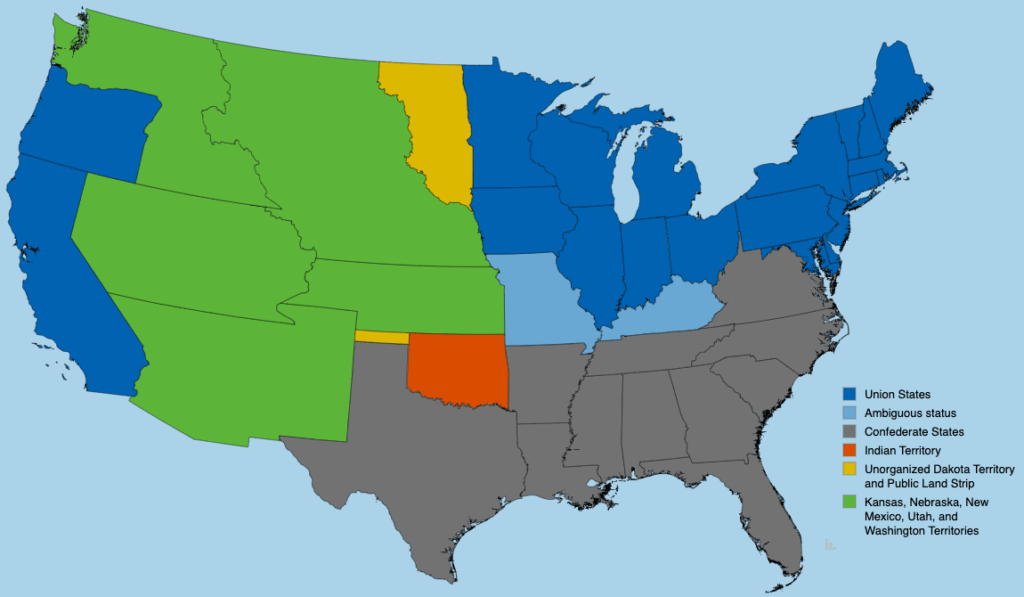Texts in Context:
Timeline of the Revolutionary Period (1800-1876)

By Gabriel Blanchard
As in our last timeline, we have two discrete halves of Western civilization: one is centered upon Europe, or more loosely the Old World; the other, for Anglophones, mainly concerns North America. Exceptionally important events appear in bold, and events which affect both halves of the West with equal gravity are shown in yellow (as a midpoint between the red and green labels of the two world hemispheres). We’ve also included two maps on this occasion: one, at the top of the post, shows the borders drawn up at the Congress of Vienna in 1815, which attempted to restore the balance of power in Europe after the sweeping disruptions of the French Revolution and the Napoleonic Wars; the other, which can be found near the bottom, shows the region of what are now the contiguous forty-eight states of the United States of America, as that region was subdivided by the US government on the eve of the Civil War (and into its first year or two).

The Western Hemisphere:
North America
The Jeffersonian Era (1800-1820)
- 1801-1805—First Barbary War between Barbary States (clients of Ottoman Empire), US: American victory.
- 1803—President Jefferson makes Louisiana Purchase from France, more than doubling US territory in interior of continent; Ohio admitted to US (17th state).
- 1804—Haitian Revolution against France concludes: Haitian victory; only known slave revolt to achieve full national independence.
- 1810-1813—Tecumseh’s War between confederation under Tecumseh (Shawnee chieftain), US: American victory, Tecumseh’s confederation disbanded.
- 1810-1821—Colonists of Viceroyalty of New Spain revolt against Spain: colonial victory, former Viceroyalty achieves independence as Empire of Mexico.
- 1811-1825—Viceroyalties of New Granada, Peru, the Río de la Plata (now Argentina, Bolivia, Chile, Colombia, Ecuador, Panama, Paraguay, Uruguay, Venezuela) achieve independence from Spain, largely under leadership of Simón Bolivar, inspiration from US.
- 1812—Louisiana admitted to US (18th state).
- 1812-1815—War of 1812 between UK, US (widely considered American theater of Napoleonic Wars): no clear victor, compromise peace.
- 1816—”Year Without a Summer” (volcanic winter caused by Mt. Tambora); Indiana admitted to US (19th state).
- 1817—Mississippi admitted to US (20th state).
- 1818—Illinois admitted to US (21st state).
- 1819—Alabama admitted to US (22nd state).
The Abolitionist Crisis (1820-1861)
- 1820—Maine admitted to US (23rd state, hitherto part of Massachusetts). Missouri Compromise in US between abolitionists, anti-abolitionists, proposing to admit Missouri as slave state but restrict all future slave states to territory south of its southern border. Founding of Liberia, West African homeland for quasi-repatriation of freed slaves.
- 1821—Missouri admitted to US (24th state).
- 1822—Portuguese king’s son Pedro, acting regent in Brazil, sides with Liberal independence movement, proclaims independence of Empire of Brazil as Emperor Pedro I.
- 1823—Captaincy General of Guatemala revolts against Spanish rule, achieves independence as Federal Republic of Central America (modern Costa Rica, El Salvador, Guatemala, Honduras, Nicaragua); President Monroe of US proclaims Monroe Doctrine (generalized opposition to European involvement in Western hemisphere).
- 1825—Erie Canal opened, connecting Great Lakes to Atlantic.
- 1830—Joseph Smith founds Church of Jesus Christ of Latter-Day Saints (a.k.a. Mormon Church).
- 1830-1850—Trail of Tears: following discovery of gold in northern Georgia, Indian Removal Act of 1830 begins forcible expulsion of approx. 60k American Indians of the “Five Civilized Tribes” (Cherokee, Chickasaw, Choctaw, Muscogee [a.k.a. Creek], Seminole) from all lands east of Mississippi River; tribes relocated to Oklahoma Territory, over 10k die of disease, other causes during expulsions.
- 1832-1849—Chief period of literary output of Edgar Allan Poe.
- 1835-1836—Texas Revolution against Mexican government: Texan victory.
- 1836—Arkansas admitted to US (25th state); Samuel Colt patents Colt Paterson revolver.
- 1837—Michigan admitted to US (26th state).
- 1845—Florida, Texas admitted to US (27th, 28th states, latter formerly independent); Frederick Douglass publishes first of three autobiographies, Narrative of the Life of Frederick Douglass, an American Slave.
- 1846—Iowa admitted to US (29th state).
- 1846-1848—Mexican-American War: US victory; Treaty of Guadalupe-Hidalgo cedes most/all of modern Arizona, California, Colorado, Nevada, New Mexico, Utah to US.
- 1848—Wisconsin admitted to US (30th state); Seneca Falls Convention, first women’s rights convention in US.
- 1849—Henry David Thoreau publishes “Civil Disobedience.”
- ca. 1850—End of Little Ice Age.
- 1850—California admitted to US (31st state).
- 1851—Hermann Melville publishes Moby-dick.
- 1852—Douglass delivers speech “What to the Slave Is the Fourth of July?”
- 1853-1854—US Commodore Matthew Perry compels opening of Japan.
- 1858—Minnesota admitted to US (32nd state).
- 1859—Oregon admitted to US (33rd state); raid on Harper’s Ferry by abolitionist John Brown: Brown defeated, executed.
- 1860—Pony Express, US express mail service between Missouri and California, created.
- 1861—Kansas admitted to US (34th state).
US Civil War and Reconstruction
- 1861—Secession of South Carolina, Mississippi, Florida, Alabama, Georgia, Louisiana, Texas; formation of Confederate government; Battle of Fort Sumter, beginning of Civil War: Confederate victory; secession of Virginia, Arkansas, Tennessee; secession of Maryland prevented by Union occupation; secession of North Carolina; Kentucky (self-declared neutral) seized by Confederacy; Missouri admitted to Confederacy without seceding from Union.
- 1862—Battle of Antietam (near Sharpsburg, MD): Union victory, bloodiest battle in war (22k+ casualties).
- 1863—President Lincoln issues Emancipation Proclamation, freeing all slaves in Confederate states; West Virginia admitted to US (35th state, hitherto part of Virginia); Cherokee National Council disavows pro-Confederate faction, abolishes slavery; death of Confederate general Stonewall Jackson; Battle of Gettysburg (near Gettysburg, PA): Union victory; Battle of Vicksburg in MS: Union victory; Lincoln delivers Gettysburg Address.
- 1864—Nevada admitted to US (36th state); Savannah campaign (a.k.a. “Sherman’s March to the Sea”) devastates Georgia.
- 1865—General Lee, leader of Confederate Army, surrenders to General Grant at Appomattox: Civil War ends, Union victory; assassination of President Lincoln in revenge by actor John Wilkes Booth; Thirteenth Amendment to US Constitution (banning slavery except as punishment for crime) made federal law.
- 1867—Nebraska admitted to US (37th state); US purchases Alaska Territory from Russia. Canadian Confederation (a.k.a. Dominion of Canada) formed.
- 1868—Fourteenth Amendment to US Constitution (guaranteeing equality before the law to all) made federal law.
- 1869—First transcontinental railroad completed.
- 1872—Yellowstone National Park (first national park) created.
- 1872-1873—Arrest of Susan B. Anthony for voting, trial (US vs Susan B. Anthony); Anthony found guilty, fined (refuses to pay, fine never enforced).
- 1873—Panic of 1873 triggers recession in US, northwestern Europe.
- 1876—Colorado admitted to US (38th state); Battle of the Little Bighorn (a.k.a. Custer’s Last Stand, Battle of the Greasy Grass) between US forces, alliance of Lakota Sioux, Northern Cheyenne, Arapaho: alliance victory; contested election of 1876 signals end of Reconstruction.
The Eastern Hemisphere:
Europe
The Regency Era ([1799]-1837)
- 1801—Acts of Union 1801 form United Kingdom of Great Britain and Ireland (hitherto two distinct kingdoms in personal union).
- 1803-1815—Napoleonic Wars between French Empire, (primarily) UK-led coalitions:
- 1803-1814—Franco-British War: British victory.
- 1805-1806—War of the Third Coalition (Baden, Batavian Republic, Bavaria, Etruria, France, Italy Spain, Württemberg vs. Austria, Naples, Sicily, Sweden, Russia, UK): French victory.
- 1806-1807—War of the Fourth Coalition (Confederation of the Rhine, France, Spain vs. Prussia, Septinsular Republic, Sicily, Sweden, Russia, UK): French victory.
- 1808-1814—Peninsular War (Confederation of the Rhine, Duchy of Warsaw, France, Holland, Spain [Bonapartist], Switzerland vs. Portugal, Spain [Bourbon], UK): Coalition victory.
- 1809—War of the Fifth Coalition (Bavaria, Confederation of the Rhine, Duchy of Warsaw, France, Holland, Italy, Naples, Saxony, Westphalia, Württemberg vs. Austria, Portugal, Sardinia, Sicily, Spain, UK): French victory.
- 1812-1814—War of the Sixth Coalition (Confederation of the Rhine, Denmark-Norway, Duchy of Warsaw, France, Italy, Naples, Spain [Bonapartist] vs. Austria, Baden, Bavaria, Hanover, Mecklenburg, the Netherlands, Portugal, Prussia, Russia, Sardinia, Sicily, Spain [Bourbon], Sweden, UK): Coalition victory; Bonaparte abdicates, is exiled to Elba in Mediterranean.
- 1804—Steam-powered train introduced in UK.
- 1805—Battle of Trafalgar between UK and French Empire, Spain: UK victory; British navy becomes world dominant.
- 1806—Emperor Francis II abolishes Holy Roman Empire to prevent Bonaparte from potentially claiming imperial dignity, continues to reign as Francis I of Austrian Empire.
- 1810—University of Berlin founded, Otto von Bismarck, G. F. Hegel, Karl Marx among first faculty.
- 1812—French invasion of Russian Empire: Russian victory; despite early French victories, campaign of attrition, guerilla warfare waged by Russians exhaust Bonaparte’s supplies, force retreat under disastrous winter conditions; massive blow to Bonaparte’s prestige. First edition of Bros. Grimm’s collected fairy tales, published as Kinder- und Hausmärchen (“Children’s and Household Tales”).
- 1813—Jane Austen publishes Pride and Prejudice.
- 1814-1816—Anglo-Nepalese War: British victory.
- 1815—Eruption of Mt. Tambora in central Indonesia, largest volcanic eruption in recorded history; 70k+ casualties, worldwide volcanic winter follow. Return of Bonaparte to France triggers Hundred Days (a.k.a. War of the Seventh Coalition) between Bonapartist France, Naples and Seventh Coalition (Austria, Bourbon France, the Netherlands, Prussia, Russia, Sardinia, Switzerland, UK, et al.), culminating in Battle of Waterloo: Coalition victory; Bonaparte again exiled, now to St. Helena in Atlantic; Congress of Vienna determines balance of power, boundaries which obtain in Europe for almost 100 years.
- 1816—”Year Without a Summer” (volcanic winter caused by Mt. Tambora).
- 1817-1819—Third Anglo-Maratha War between Maratha Confederacy, UK: British victory; UK annexes Maratha Confederacy.
- 1818—Mary Shelley publishes Frankenstein; or, The Modern Prometheus. Founding of Reform Judaism.
- 1821-1830—Greek War for Independence against rule by Ottoman Empire: Greek victory; influence of France, Russia, UK impose Otto of Wittelsbach as King of Greece; majority of Greeks remain in areas under Ottoman rule.
- 1824-1826—First Anglo-Burmese War between Burmese Empire, UK: British victory, territorial gains in India, Southeast Asia.
- 1825—Decembrist Revolt against government of Russian Empire: state victory.
- 1826—Internal combustion engine patented.
- 1827—Photography invented.
- 1829—Sir Robert Peel founds Metropolitan Police Service in London; Catholic Relief Act politically emancipates Catholics in UK.
- 1830—July Revolution deposes French King Charles X (who now becomes head of Legitimist branch of House of Bourbon), crowns constitutionally monarchist cadet of dynasty (Orléanist Bourbons), Louis-Philippe, Duke of Orléans. Belgian Revolution achieves independence of Belgium from Netherlands.
- 1830-1895—”Great Game” conducted in Central Asia (chiefly Afghanistan) between British, Russian Empires.
- 1831—November Uprising against Russian government in Poland, culminating in Battle of Warsaw: Russian victory.
- 1831-1836—Voyage of Charles Darwin on HMS Beagle.
- 1832—Reform Act 1832 in UK abolishes “rotten boroughs.”
- 1833—Slavery Abolition Act in UK; Alexis de Tocqueville publishes Democracy in America.
- ca. 1833-1841—Main period of Oxford Movement, founding of Anglo-Catholicism.
Victorian Era (1837-[1901])
- 1837—Accession of Queen Victoria over UK; Charles Dickens publishes Oliver Twist; telegraphy invented.
- 1839-1842—First Opium War between China, UK: British victory; Treaty of Nanking cedes Hong Kong to UK.
- 1840—Marriage of Queen Victoria to Prince Albert of Saxe-Coburg-Gotha.
- 1842—First use of anæsthesia.
- 1843—Søren Kierkegaard publishes Either/Or and Fear and Trembling.
- 1845—St. John Henry Newman converts to Catholicism.
- 1845-1849—Great Famine in Ireland (a.k.a. Great Hunger, Irish Potato Famine) caused by potato blight (ruining then-primary food crop), reluctance of Whig government to provide aid; approx. 1M Irish die due to famine.
- 1846-1880—Literary career of Fyodor Dostoevsky.
- 1847—Brontë sisters publish Agnes Grey, Jane Eyre, Wuthering Heights.
- 1848—Marx, Friedrich Engels publish Das Kommunistische Manifest (“The Communist Manifesto”). Revolutions of 1848, supporting Liberal, nationalist causes:
- Austria: beginning of Hungarian Revolution (lasts until following year), attempt to throw off Habsburg rule; Supreme Ruthenian (i.e., Ukrainian) Council formed in Galicia, advocating autonomy within empire.
- Denmark: threat of popular revolt leads new King Frederick VII to change realm from absolute to constitutional monarchy.
- France: February Revolution deposes King Louis-Philippe, declares Second French Republic, elects Louis Bonaparte (nephew of Napoléon) president.
- Italian states: revolts throughout Habsburg-ruled Kingdom of Lombardy; rebellion in Papal States abolishes civic power of Pope Pius IX, establishes Roman Republic; Republic of St. Mark (Venice) declares independence from Austrian Empire, maintains existence for 17 months; revolt against Bourbon rule in Sicily; Grand Duke Leopold II of Tuscany authorizes constitution.
- Prussia: Poles rebel in Grand Duchy of Posen.
- Romania: Moldavian, Wallachian Revolutions in regions east, south of Carpathian Mountains, stymied by Ottoman, Russian forces.
- 1848-1849—Second Anglo-Sikh War between Sikh Empire, UK: British victory; entirety of India under British control.
- ca. 1850—End of Little Ice Age.
- 1851—Great Exhibition of the Works of Industry of All Nations (a.k.a. Great Exhibition at Crystal Palace) in London.
- 1852—Louis Napoléon seizes power in France as Emperor Napoléon III, institutes Second French Empire.
- 1853-1856—Crimean War between Britain, France, Ottoman Empire and Russia: Anglo-Franco-Turkish victory; Florence Nightingale founds modern field of nursing.
- 1854-1855—Kierkegaard’s “Attack on Christendom,” harsh critique of Church of Denmark, cut short by his death.
- 1856—Neanderthal man discovered in Neander Valley (located in Rhineland, Germany).
- 1857-1858—Revolt by Indian peoples against British East India Company, resulting in transfer of India to crown rule.
- 1859—Charles Darwin publishes On the Origin of Species by Natural Selection.
- 1861—Serfdom abolished in Russia; death of Prince Albert: Victoria goes into deep mourning* for remainder of her life.
- 1862—Victor Hugo publishes Les Misérables.
- 1863—J. S. Mill publishes Utilitarianism.
- 1865—Fr. Gregor Mendel formulates laws of genetic inheritance; Lewis Carroll (a.k.a. Charles Lutwedge Dodgson) publishes Alice’s Adventures in Wonderland.
- 1866—Austro-Prussian War: Prussian victory, collapse of German Confederation, formation of North German Confederation.
- 1866-1868—Famine in Finland.
- 1867—Luxembourg Crisis: war narrowly averted between French Empire, Prussia.
- 1867-1869—Famine in Sweden.
- 1869—Leo Tolstoy publishes War and Peace; Dmitri Mendeleev formulates periodic table of elements; opening of Suez Canal, linking Mediterranean, Red Seas.
- 1869-1870—First Vatican Council defines papal infallibility; council cut short due to unification of Italy.
- 1870-1871—Franco-Prussian War: Prussian victory; provinces of Alsace, Lorraine in northeastern France annexed by Prussia; unification of North German Confederation as German Empire, collapse of Second French Empire, institution of French Third Republic.
- 1871—Bismarck opens Kulturkampf (“culture war,” attack on legal status of Catholic Church) in German Empire.
- 1871-1872—George Eliot (Mary Ann Evans) publishes Middlemarch.
- 1872—Friedrich Nietzsche publishes The Birth of Tragedy.
- 1873—Panic of 1873 triggers recession in US, northwestern Europe; abdication of King Amadeo of Spain leads to First Spanish Republic.
- 1874—Founding of Impressionist movement; founding of Home Rule Movement in Ireland; abolition of British East India Company; collapse of First Spanish Republic, Bourbon Restoration under King Alfonso XII.
- 1875—Beginning of twenty-five year famine in Raj (British India).
- 1876—First complete performance of Der Ring des Nibelungen (“The Ring of the Nibelungs,” a.k.a. the Ring Cycle) by Richard Wagner; Queen Victoria proclaimed Empress of India.

Les Misérables is written for all nations. I do not know whether it will be read by all, but I wrote it for all. ... The sores of the human race, those great sores which cover the globe, do not halt at the red or blue lines traced upon the map. In every place where man is ignorant and despairing, in every place where woman is sold for bread, wherever the child suffers for lack of the book which should instruct him and of the hearth which should warm him ... Les Misérables knocks at the door and says: "Open to me, I come for you."
Victor Hugo, letter to M. Daelli, 1862
*Deep mourning was a technical term in nineteenth-century etiquette. It does not denote the emotional state of the mourner, but social conventions observed by them, designed to protect the delicate emotional state a mourner might experience (without compelling them to embarrass themselves by referencing or exhibiting such feelings directly). For instance, attendance at social events was severely curtailed, and letters were written on black-edged mourning stationery. The principal signal lay in the mourner’s dress—entirely black, and with no lustrous materials, e.g. silk or precious stones. Normally, deep mourning would give way to second mourning after a period, which permitted some amount of luster, including mourning jewelry (made by preference from jet), as well as a few set colors as accents in the wardrobe (chiefly white, grey, and purple).
Gabriel Blanchard is a freelance author contracting with CLT. He has a degree in Classics from the University of Maryland, College Park, and lives in Baltimore.
If you enjoyed this piece, you might also like our series on what the late Mortimer Adler dubbed “the Great Conversation”—the philosophical, scientific, artistic, mathematical, political, literary, and religious exchange that has been going on among our forebears for thousands of years. Our introduction to and index of its topics (inspired by Adler’s own Syntopicon), with links to our posts on each one, can be found here.
Published on 28th August, 2025. Page image of The Coronation of Napoléon (1804) by Jacques-Louis David; the actual content of the painting shows Bonaparte already crowned Emperor of France, bestowing a queenly crown upon his wife, thenceforward the Empress Joséphine de Beauharnais.